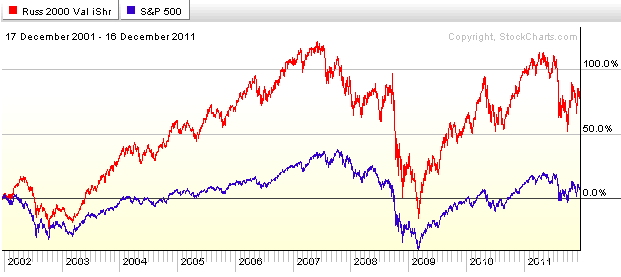If I told you that you could buy an asset class that soundly beat the S&P 500 index on a regular basis over the last ten years, you'd probably call me a liar – but at the very least you'd be intrigued.
And while I've been trying to bring this asset class to the attention of the main street investment public, it still hasn't caught on.
And it's all thanks to a very pervasive myth about this asset class…
Many people think that small cap stocks are all risky start-up growth companies. They believe that any company with a market cap below $3 billion should only be purchased if the investor is looking for capital appreciation, and not income.
Don't let this myth distract you from this unique asset class, because small cap dividend investors have actually enjoyed some of the best returns – both capital gains and income – available in the stock market over the last decade.
Just look at this 10-year chart of the iShares Russell 2000 Value ETF (NYSE: IWN). The ETF invests in small cap value stocks in the Russell 2000 index, and currently yields 2.2 percent annually.
Over this time frame the S&P 500 is up a meager 7.5 percent. Yet small cap value stocks soared 81 percent. That's over ten-times the return of the broad market.

How can these small companies perform so much better than their large cap competitors?
First, many don't ever expect to grow into large companies. If they did, they'd be putting their earnings toward growth initiatives, not returning them to shareholders in the form of dividends. Rather, management is focused on the core business and does not get sidetracked by every new potential blockbuster product.
There is quite a bit of research showing that many growth initiatives actually destroy value. Paying a dividend guarantees a return on investment to shareholders.
Second, a value-oriented perspective doesn't mean growth isn't important. To the contrary – many small companies are actually growing much faster than larger competitors but because they are not closely followed by analysts, their success is largely unknown.
You might think that with small cap value stocks performing so well, small cap growth stocks have done even better. This is another myth – while small cap growth has also easily beaten the market over the last decade with a return of 53 percent, small cap value still comes in at number one.
I use the iShares Russell 2000 Growth ETF (NYSE: IWO) to track growth stocks in the Russell 2000 index.
This outperformance is compelling evidence that small cap value is the way to go over the long term. And for part of your portfolio, it absolutely is.
But don't go selling all of your growth stocks and piling into value right now. My point in juxtaposing these ETFs is to get you thinking about how to allocate between growth and value in the small cap space at different times – not to say ditch one and go with the other. Ideally, you should buy and hold both over the long-term.
These two small cap ETFs make it about as easy as possible to buy market outperformance with the click of a button. And many online brokers offer commission free trading for ETFs now too.
One caveat to looking too closely at ETFs tracking small cap index returns – there is turnover in the underlying index. Growth stocks tend to be more volatile, and that means if their share price falls they could get bounced from the underlying index.
This doesn't help returns, because these stocks will never have a chance to recover their gains. Also, many of the weakest companies won't make the index until they have already posted huge gains, so the index misses out there too.
Conversely, when small cap growth shines some stocks will outgrow the small cap constraint, so they need to be removed. That means some of the best performing small cap growth stocks are not calculated in the index returns.
However, all that said it's clear that small cap value should be a part of every portfolio. The consistent returns are just too good to ignore.
 Facebook
Facebook
 Twitter
Twitter